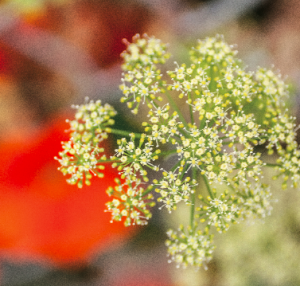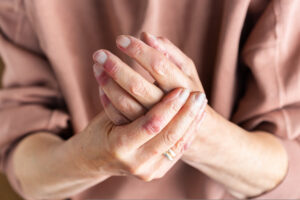Playing in the park on a warm, sunny day in San Francisco is one of 6-year-old Eshar’s most beloved summertime activities. But as mom Navdeep Gosal knows all too well, hot weather doesn’t always agree with Eshar’s eczema. Her son first started showing symptoms during infancy, which then exploded into head-to-toe atopic dermatitis along with allergic rhinitis and life-threatening food allergies.
“By the time my son turned 3, he had severe eczema all over his body,” Gosal said. “I had to stop working because his nanny couldn’t control his itch and his school couldn’t care for him the way I wanted them to care for him. I changed so many different dermatologists and allergists trying to find answers, but all of the allergy tests were telling us he was allergic to everything. We just had no idea what was causing it.”
The way climate and weather affect our eczema has fascinated scientists around the world for decades. Some people have fewer flares in the summertime, while others see their eczema worsen in warmer weather. For many people, including 40-year-old Barjes Angulo, it’s not a particular season that triggers the rashes and allergic reactions, but the time of year when the weather transitions from warm to cool and vice versa.
“The changing of the seasons is typically when I feel it,” said Angulo, who has been living with atopic dermatitis for roughly 25 years. “Summer to fall, usually around September, can be rather challenging and also when we go from a cold winter to spring and into the summer. But the good news is that I can feel the onset of [an eczema flare] and prepare for it a little bit.”
When the weather heats up, that’s usually Angulo’s cue to increase his water intake and avoid the things he knows will trigger his eczema such as alcohol, fried foods, places with no air-conditioning and, most of all, stress — something he’s learned to manage diligently as founder and CEO of a financial services firm in New York City.
“Sometimes if I feel like [my eczema] is going to ignite and I don’t have major appointments in the morning for work, I’ll stay in bed longer, get a couple extra hours of sleep, or maybe read and try to relax before I head out for the day,” he said. “I may stay away from the gym for a couple of days so the heat and sweat won’t ignite a breakout and wear cotton clothes that provide more comfort and ventilation.”
Regulating body temperature is key to controlling eczema during the summer months, said Jeffrey Bienstock, MD, FAAP, who is managing partner at Pediatricare Associates in Fair Lawn, New Jersey. “We know that eczema is something we see all year-round,” he said. “But in the summertime, it can be a little more challenging when the hot weather can make eczema itch more fiercely and the humidity makes it more difficult to control. So regulating the body temperature and ambient humidity is key.”
Break a sweat
Perspiration is a natural defense mechanism for lowering our body temperature, and since sweat is mostly water, the evaporation process is what cools the body down, according to Dr. Steven Q. Wang, director of Dermatologic Surgery and Dermatology at Memorial Sloan-Kettering Cancer Center in Basking Ridge, New Jersey.
However, because human sweat contains trace elements of zinc, copper, iron, nickel, cadmium, lead, manganese, sodium and chloride, the build-up of these chemicals could irritate a person’s eczema, he said. In fact, the areas of the body where moisture accumulates most, such as the insides of the elbows, back of the knees and around the neck, tend to be hot spots for eczema rashes. So if you sweat through your clothes, you should rinse off with fresh water and change into a new outfit.
“Also, the temperature itself can be an irritant that will worsen the itching sensation,” Wang added. “When the temperature is hot and the body is trying to cool off, you have dilation of blood vessels that triggers the movement of inflammatory cells. If you’re lying on the couch and develop a heat rash, for instance, because your sweat glands are being blocked, that can trigger inflammation and the itching sensation.”
Gosal is diligent about keeping her son’s body temperature regulated. “I try to carry handheld fans with me. I put ice-cold water in there so the air comes out cold and moist, which will quickly cool him down if he’s playing outside and gets very hot,” she said. “I also make sure perspiration doesn’t stay on his body. I keep several bottles of water handy. When he feels overheated, he has one to drink and another one for me to rinse o the perspiration. Then I re-moisturize him and reapply sunblock.”
Make a splash
Angulo used to dread going to the beach with his friends because “it meant I would have to take my shirt off and expose my itchy, red, inflamed skin,” he admitted. “But recently, I came to the realization that my skin likes being in saltwater. It feels more relaxed. I spent three weeks in Thailand two years ago and was scared because I didn’t know how my skin would react. It was completely fine. Now I don’t care how I look to people when I take my shirt off at the beach.”
 Swimming in saltwater can actually be helpful for some people with eczema, Wang noted. “There are a couple of components here — one, when you go to the beach, you are on vacation and more relaxed. By destressing yourself, it will make the eczema condition better,” he said. “Two, the combination of salt plus ultra-violet (UV) light (as well as vitamin D) can be very beneficial. That’s why we use light UVB treatment in phototherapy. However, salt pulls water out of skin faster, so you’ll want to wash off the saltwater as soon as possible and remoisturize.”
Swimming in saltwater can actually be helpful for some people with eczema, Wang noted. “There are a couple of components here — one, when you go to the beach, you are on vacation and more relaxed. By destressing yourself, it will make the eczema condition better,” he said. “Two, the combination of salt plus ultra-violet (UV) light (as well as vitamin D) can be very beneficial. That’s why we use light UVB treatment in phototherapy. However, salt pulls water out of skin faster, so you’ll want to wash off the saltwater as soon as possible and remoisturize.”
Bienstock tells patients with eczema to bring bottles of fresh water with them to the beach to rinse off the saltwater, and the same goes for anyone taking a dip in chlorinated pools. “We tell patients that if they are in the chlorine pool, the first thing they should do is rinse off the pool water with fresh water and pat the skin dry,” he said. “Then lather up with some form of emollient to lock in moisture.”
Control those allergies
 Our eczema will flare when we’re around things that cause our allergies to go haywire such as dust, mites, dander, mold, pollen and certain foods. Even though these substances, or allergens, are not harmful to everyone, those with eczema could experience hives, itching, sneezing, runny nose and swelling. “Regular environmental care is something we need to do whether it’s the middle of July or middle of January,” Bienstock said.
Our eczema will flare when we’re around things that cause our allergies to go haywire such as dust, mites, dander, mold, pollen and certain foods. Even though these substances, or allergens, are not harmful to everyone, those with eczema could experience hives, itching, sneezing, runny nose and swelling. “Regular environmental care is something we need to do whether it’s the middle of July or middle of January,” Bienstock said.
“Dust is around 12 months a year, so if you’re allergic to dust, you’ll want to make sure you’re cleaning the house to take appropriate measures to prevent dust mites. Mold and other environ- mental allergens can be a big problem that some people don’t even realize. But when we hit early spring, when the weather starts to warm, we see more problems with seasonal allergies, such as pollen. Depending on what you are allergic to, be it dust, mold, pet dander or pollen, these allergic reactions could march through all four seasons.”
Bienstock will sometimes put his pediatric patients on antihistamines just as the allergy season begins. “Treatment could also include desensitization through allergy shots,” he said. “But more importantly, I ask parents to take the appropriate measures such as telling their children to play during certain hours. When they come back in the house, wash their faces and hands because that pollen could be sitting on their eyebrows, eyelashes and all over their hands. This also might be a good opportunity to put on a fresh T-shirt.”
Gosal said her son takes Zyrtec (cetirizine) in the morning and Atarax (hydroxyzine) at night during flare-ups to combat his allergies, and Singulair (montelukast) every evening for his asthma symptoms. “I am very vigilant when we travel,” she said. “I check pollen levels and take extra medication as a precaution. When we get to the hotel, I check to make sure there is no mold or pet dander.”
She even brings her own sheets and towels when they travel, “which is extreme — everyone laughs at me — but when he’s sleeping, he’ll get a flare-up wherever his face is touching the sheets,” Gosal explained. “I have to change the sheets every day because of all the moisturizers going on them, and I make sure they are 100 percent cotton and lightweight. As you can see, I do not take risks with my son’s eczema, and that is why we keep it under control.”








